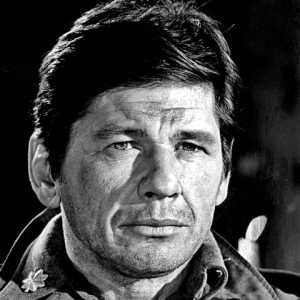Charles Bronson (born Charles Dennis Buchinsky; November 3, 1921 – August 30, 2003) was an American actor. Known for his "granite features and brawny physique," he gained international fame for his starring roles in action, western, and war films; initially as a supporting player and later a leading man. A quintessential cinematic "tough-guy", Bronson was cast in various roles where the plot line hinged on the authenticity of the character's toughness and brawn. At the height of his fame in the early 1970s, he was the world's No. 1 box office attraction, commanding $1 million per film.
Born to a Lithuanian-American coal mining family in rural Pennsylvania, Bronson served in the United States Army Air Forces as a bomber tail gunner during World War II. He worked several odd jobs before entering the film industry in the early 1950s, playing bit and supporting roles as henchmen, thugs, and other "heavies". After playing a villain in the Western film Drum Beat, he was cast in his first leading role by B-movie auteur Roger Corman, playing the title character in the gangster picture Machine-Gun Kelly (1958). The role brought him to the attention of mainstream critics, and led to sizable co-lead parts as an Irish-Mexican gunslinger in The Magnificent Seven (1960), a claustrophobic tunneling expert in The Great Escape (1963), a small-town Southern louche in This Property Is Condemned (1966), and a prisoner-turned-commando in The Dirty Dozen (1967).
Despite his popularity with audiences and critics, Bronson was unable to find top-billed roles in major Hollywood productions. His acclaim among European filmmakers, particularly in France and Italy, led to a string of successful starring roles on the continent. He played a vengeful, Harmonica-playing gunman in Sergio Leone's epic Spaghetti Western Once Upon a Time in the West (1968), an offbeat detective in Rider on the Rain (1970), real-life Mafia turncoat Joe Valachi in The Valachi Papers (1972), and starred opposite Alain Delon in Adieu l'ami (1968) and Red Sun (1971). The success of those films proved his capability as a leading man and launched him to international stardom. In his home country, he played the architect-turned-vigilante Paul Kersey in Death Wish (1974) and its four sequels, a role that typified the rest of his career. He continued acting well into the 1980s, often in Cannon Films productions. His final role was in a trilogy of made for television films, Family of Cops, aired between 1991 and 1993.
For his contributions to the film industry, Bronson received a star on the Hollywood Walk of Fame in 1980.
Early life and war service :
Bronson was born Charles Dennis Buchinsky, the eleventh of fifteen children, into a Roman Catholic family of Lithuanian origin in Ehrenfeld, Pennsylvania, in the coal region of the Allegheny Mountains north of Johnstown, Pennsylvania. His father, Walter Buchinsky (born: Valteris P. Bučinskis), was a Lipka Tatar from Druskininkai in southern Lithuania. Bronson's mother, Mary (née Valinsky), whose parents were from Lithuania, was born in the coal mining town of Tamaqua, Pennsylvania.
Bronson did not speak any English at home during his childhood in Pennsylvania, like many children he grew up with. He recalled that even back when he was in the army, his accent was strong enough to make his comrades think he came from another country (despite Bronson having been born and raised in the US). Besides English, he could also speak Lithuanian, Russian and Greek.
In a 1973 interview, Bronson said that he did not know his father very well and "I'm not even sure if I loved him or hated him." He said that all he could remember was that when his mother said that his father was coming home, the children would hide. When Bronson was 10 years old, his father died and he went to work in the coal mines, first in the mining office and then in the mine. He later said he earned one dollar for each ton of coal that he mined. In another interview, he said that he had to work double shifts to earn $1 a week. Bronson later recounted that he and his brother engaged in dangerous work removing "stumps" between the mines, and that cave-ins were common.
The family suffered extreme poverty during the Great Depression, and Bronson recalled going hungry many times. His mother could not afford milk for his younger sister, so she was fed warm tea instead. His family was so poor that he once had to wear his sister's dress to school for lack of clothing. Bronson was the first member of his family to graduate from high school.
Bronson worked in the mine until he enlisted in the United States Army Air Forces in 1943 during World War II. He served in the 760th Flexible Gunnery Training Squadron, and in 1945 as a Boeing B-29 Superfortress aerial gunner with the Guam-based 61st Bombardment Squadron within the 39th Bombardment Group, which conducted combat missions against the Japanese home islands. He flew 25 missions and received a Purple Heart for wounds received in battle.
